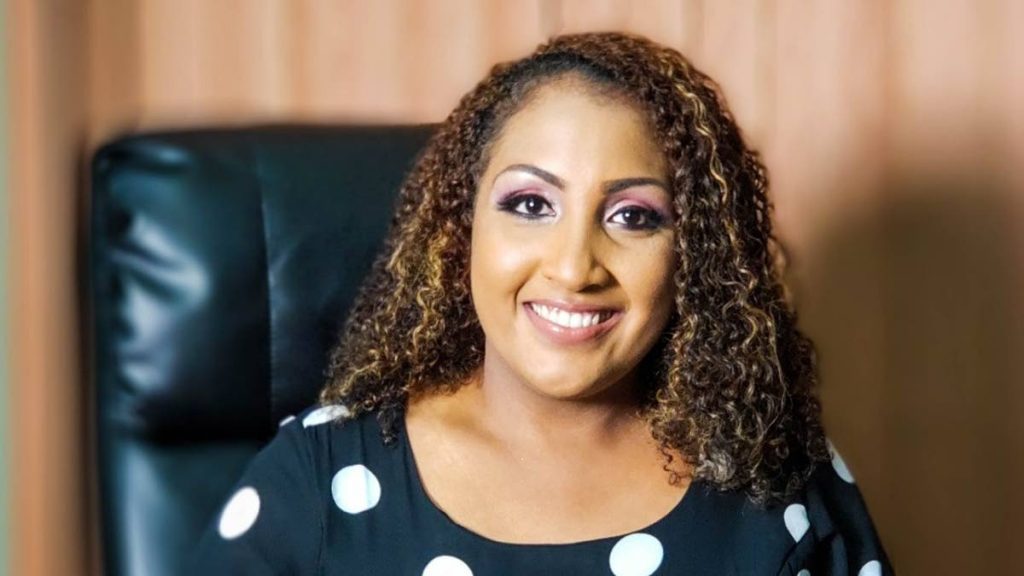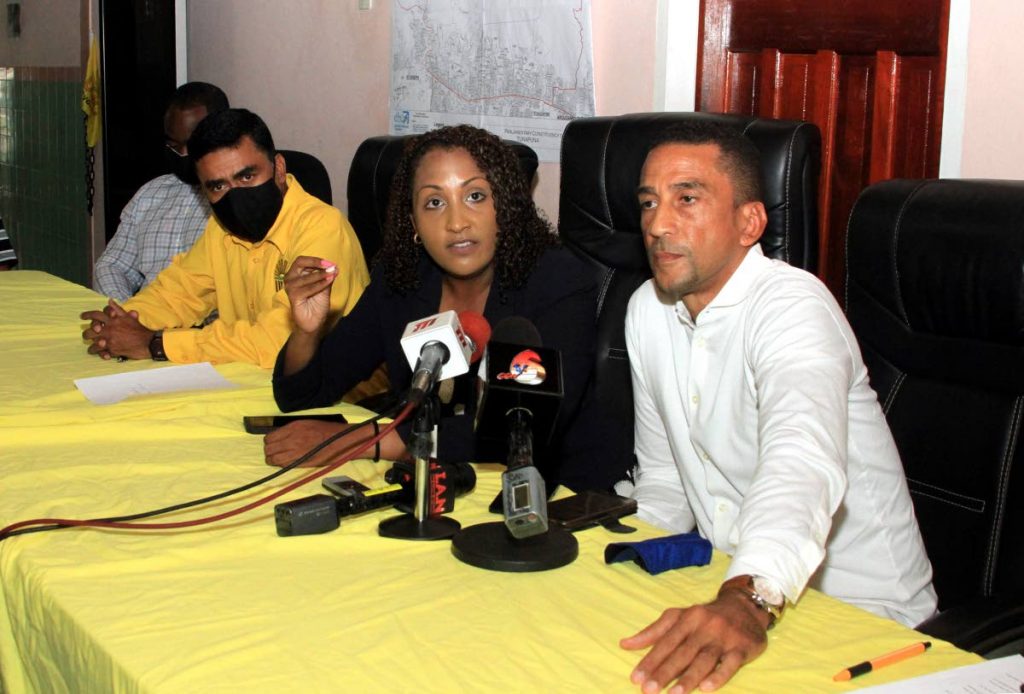Anita Haynes: The voice of the UNC

The new MP for Tabaquite, PRO for the United National Congress (UNC) Anita Haynes, has been interested in politics since her pre-teens.
When she was around seven, her grandfather would talk to her about politics and she would imagine herself as an MP or a minister. It was a surreal moment when she learned she had won the seat in the August 10 general election.
She said she worked very hard for the position while campaigning and during her studies and was excited about her new journey. But it was difficult to see some of her friends and colleagues not being able to do the same.
Haynes, 33, told Newsday's WMN magazine when she got a full scholarship to St John’s University in New York, she studied finance for the first year and a half. She wanted career stability but changed her major because she was not happy, and switched to politics.
“Then 2010 comes around and Mrs (UNC leader Kamla) Persad-Bissessar wins to become TT’s first female Prime Minister, and in that moment I decided to wrap up my internship and come back home, because there I was, outside, helping all these other societies build networks to make more progressive moves, and our country is doing something.”

She returned to TT in 2011 and studied for a law degree from the University of London. She got a job at the Office of the Prime Minister in multilateral relations, which she described as an “easy fit” because of her educational background, but she wanted to do more. So a few years later, she got involved in party politics, which led her to becoming the UNC PRO in 2017, a senator from September 2017-July 2020, and now an MP.
Tabaquite to open politics
Haynes said Tabaquite had always strongly backed the UNC, so she was confident of her win. The party won the seat for two consecutive terms under her predecessor Dr Surujrattan Rambachan who was first elected in 2010. He retired from active politics ahead of the general election saying he was giving way to the future leaders of the party, like Haynes.
Her job as PRO was to represent the UNC brand, build excitement about working on policies, and get people involved. So putting in her name in as a candidate and being elected was a culmination of it all.
She said the party's plans were grounded in the people who lived in the various constituencies. In addition, she was from Piparo, a rural area, so she understood the plight of her constituents. The issues were mainly infrastructural, including bad roads, a lack of pipe-borne water, and flooding.
“When you can’t meet your basic needs, it’s difficult to talk about all the other things you want to get done.”
She said because the UNC did not win the election, she would have to lobby the government for everything. At the same time, she said she would also do what she could through private partnerships, which she and the UNC Youth Arm were already working on, in terms of digital devices and internet access for students.
She intends to keep in contact with the people, let them be aware of what she is doing and what she can realistically do. She also intends to find more ways to get youths involved in the community, and help people become more self-sufficient.

Haynes said one of her goals in the next five years was to open up spaces and clear avenues for those who want to become more involved in politics or who just wanted to make a difference.
“It’s time overall to move our politics forward...We can move away from just our rallies and cottage meetings to how to do things in a manner that would get people to pay attention and talking about policy in a progressive manner and not just old talk.”
She said people in TT were not inspecting party policies but rather, voting on their emotions, which, she said, was how the system was set up. She believes the country needs more people who want to see change in the system.
So during her campaign she distributed her contact information as well as her plans for the constituency. There was a disconnect between parliamentarians and the people they represented. She shared her ideas and wanted to hear their ideas, so they could work together to prioritise and get to work.
She said people had to get into the spirit of getting organised as a community by getting information on an issue and lobby to get what they want accomplished.
Women leaders wanted
Haynes said it was important that women were not only involved in politics but commanding significant status at the decision-making table. TT has done well over the years, she feels, but could do better, since women made up 50 per cent of the population but only 30 per cent of the decision-makers.
She said for years women have been placing first in exams, getting more scholarships, and being more numerous in graduating classes – but that was not reflected in their numbers in government, and on state and company boards.
TT’s need for improvement could also be seen in the way policies were talked about and crafted.
She said men and women live fundamentally different lives. For example, a couple could be having a child but the woman’s life had to adjust more, as she carried and then gave birth to the baby. She said it was important to build that understanding into policy-making and so women were necessary as they understood those issues personally, while men had a more academic understanding.
“Women fall off the track for leadership for a number of reasons, including personal decisions, but how do we make the spaces more adaptable to the different kinds of lives that we live?”

Haynes said she looked at some of the barriers to women entering politics and a major issue was vicious personal attacks. She admitted men were also attacked on the political stage, but said it was usually not personal.
Thus in the campaign this year, people were using videos not to disqualify women candidates or to indicate they were not fit for public office, but to shame them into dropping out.
So she would like to ensure enough women were in politics to allow a show of strength, to have other women to stand with and say that kind of politics was not acceptable and would not be successful.
“In TT we don’t really have absolute barriers to say that women can’t enter here, but there are blockages in the system that you as a woman will understand as a conversation to discourage you behind closed doors.
“I must say women have been very adaptable and have been successful in a system that was created before we were out in various fields in such great numbers. But there must come a time when we say, 'We’re not going to adapt, we’re going to thrive, we’re going to allow this system to be fixed in a way that allows all of us an equal playing field.'”
It was necessary to move towards a more holistic and inclusive society, she said, and to do that, the voice of women was critical.
Ready to tackle it all
Haynes told WMN as PRO she had
to deal with any major controversy or disagreement before
the recounts for five constituencies – San Fernando West, St Joseph, Tunapuna, Toco/Sangre Grande, La Horquetta/Talparo – which the party requested after the election. The results remained unchanged as the EBC officially declared the PNM had won 22-19.
She defended the UNC’s request saying if the election process was to be improved, the irregularities needed to be discussed, even if it made people uncomfortable.
“We have to be focused on constant improvement instead of saying, "'That's just the way it is.’”
Asked how she felt when people say she is being groomed for leadership in the future, she said at the moment she was focused on being the best MP she could be.
On the issue of race, she said generally people understand that TT’s politics is divisive. Despite knowing this, she said she found it heartbreaking to see the vitriol that spread on social media after the election.
“For me, as a young parliamentarian who identifies as a Trinidadian with no prefix attached – that is a personal choice and I’m not in any way suggesting that is how everybody should identify themselves – the conversation on race is a difficult one, but one that absolutely must happen.
"And not in the context of an election, when emotions are running high. We must do the difficult work of understanding where we are, how we got here, and most importantly where we want to go.”
She said people like to identify TT as the “melting pot of the Caribbean, a rainbow country and that ‘all ah we is one family,’” but it was obvious that work needed to be done. The issue of race was “highly emotive” and people used it to trigger certain responses and that was very dangerous.
The more people thought about diversity at the decision-making table, she argued, the more they would be actively aware whether or not those making decisions were accurately representing TT in ethnicity, gender, age. Then, she said, the situation would get better.
“But it is hard, national work and not something that should be left to just politicians. The more we strengthen ourselves, build our experience and use the platforms we have now to create more and bigger platforms for discussion I think we will get better.”
And Haynes says she's ready to do that hard work to help build a better TT.

Comments
"Anita Haynes: The voice of the UNC"